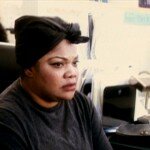A precious story of mental illness
Since the novel Push became Precious and hit the film festival circuit earlier this year, there were nothing but rave reviews for the film, especially the performances given by comedienne Mo’Nique, singer Mariah Carey, and newcomer Gabourey Sidibe. But once the film hit theater screens across the country, reviews were not stellar all across the board. While the performances of the actresses are still largely praised, many movie reviews and critiques allege exploitation; stereotyping the Black, female image; the continued villainization of Black women and motherhood; colorism; and a host of other issues.

Courtesy of Access Hollywood
What’s interesting for me, however, is that I didn’t see any of those things, and I will be the first to tell you that I am generally on the lookout for any sign of negativity as it pertains to Black women (has anybody seen The Blind Side yet?). Negative depictions of race or gender, or even class, weren’t pervasive.
For me, the central theme of this film is mental illness and all the trauma that stems from it.
Most of the issues present in Claireece “Precious” Jones’ life have something to do with the trauma she endures at the hands of severely mentally ill parents (and I am considering Precious’ rapist father to be mentally ill as well). It’s true that both Precious and her mother, Mary, have weight issues.
Yes, Precious spends a lot of time wishing she were lighter skinned (or just plain White) and hoping for a lighter skinned boyfriend. And everyone can see that Mary isn’t even close to being a good mother. However, if you are an undereducated, illiterate child living in a home with a physically, emotionally, and sexually abusive, mentally ill mother and an absentee father who only makes sporadic, incestuous visits until his eventual AIDS related death that occurs only after he has fathered your two children, one of which has Down Syndrome, and gives you HIV, then I can see how it might be rather difficult to develop and maintain a healthy self-esteem and a properly balanced diet.
If your mother, the person who is supposed to always have your best interests at heart, is telling you, day in and day out, how dumb and ugly you are because of the color of your skin, length of your hair, or size of your waistline, then there’s a big chance that you’re going to wish you could be whoever it is you think embodies all the things you are told you don’t possess. If you attend a school that doesn’t notice or care that you aren’t engaged and learning as you should, you might never realize you’re smart or good at anything. With a father who is only present to rape you, searching for love in a form that directly opposes his is an understandable goal. There aren’t enough positive self-affirmations in the world, not that she knew any in the first place, that can get a kid through that kind of unloving, unhealthy environment without any scars.
Under such extreme conditions that are further compounded by poverty, opportunities in life are most likely going to be pretty limited. Poverty and inadequate education make life really hard to navigate. Receiving quality help for mental illness takes money. Knowing you have a mental problem that needs help takes knowledge (or at least people around you with knowledge to get you the help). Being able to eat healthily usually takes money. Understanding the necessity of exercise and how to make better choices about food given what you can afford takes knowledge. Ending a cycle of abuse takes the kind of awareness neither Precious nor her mother possess without intervention. Even after meeting with social workers, it’s clear that Mary still doesn’t have a full grasp of her behavior and how her abusive past shaped Precious’ entire life. Thankfully the story of Precious isn’t real, but that doesn’t mean there aren’t girls and women out there who know all too well exactly what Precious has been through.
Precious’ story isn’t a tale of how hard it is to be a Black girl. It’s not a snapshot of the life of the average Black person in America. It’s not an exploitative, voyeuristic “exhibition of ghetto tragedy and female disempowerment as if it were raw truth.” Precious is the story of any girl who has grown up in a house filled with unchecked madness and abuse. Acknowledging that Precious is a survivor of mental illness is not excusing the behavior of her parents or undermining her life experiences. Rather, it helps to explain and understand the trauma surrounding her life, her outlook, her mother’s behavior, the need for better social service interventions, and the resiliency of a girl shown even the slightest glimmer of love.
Author: Kirwan Institute (427 Articles)



COMMENTS